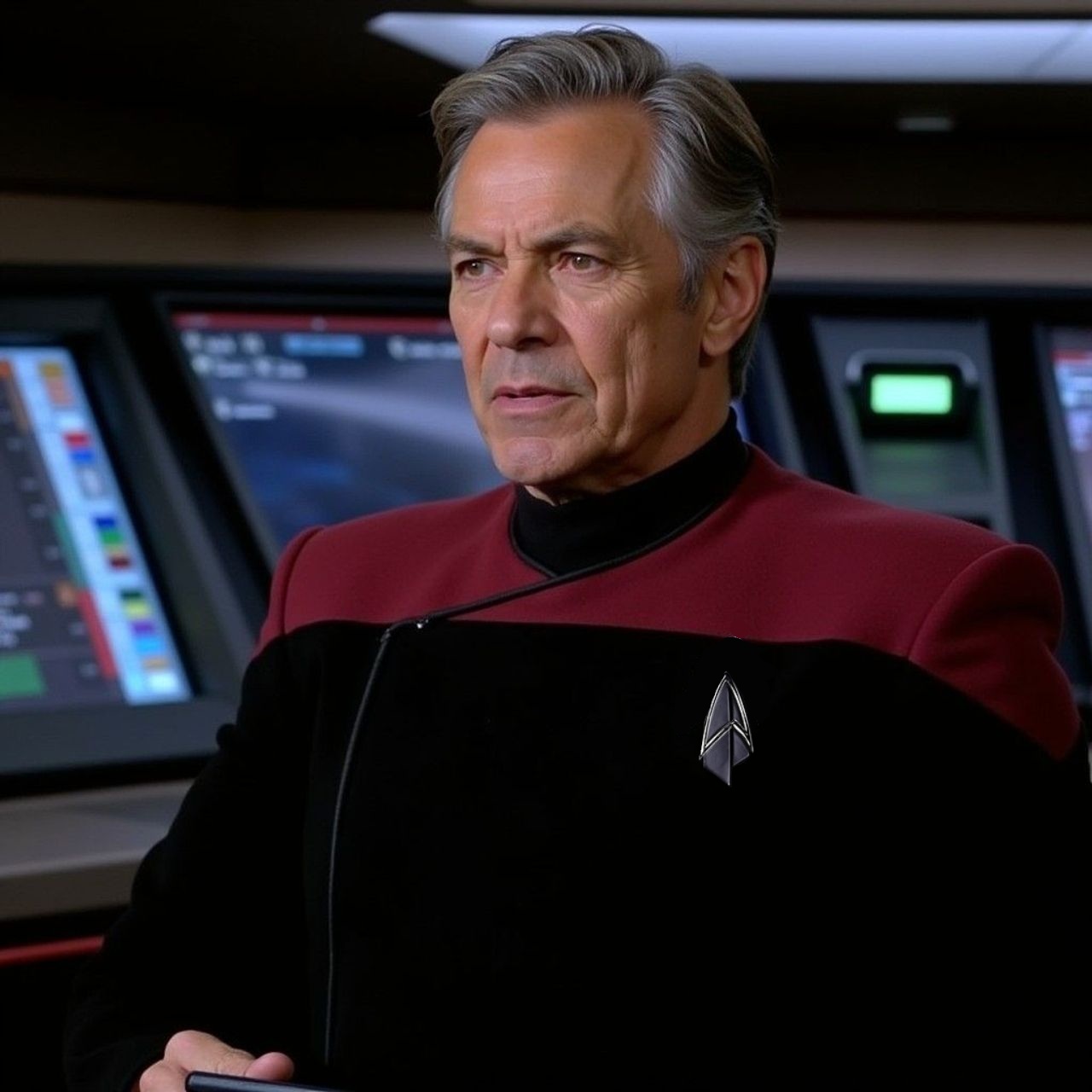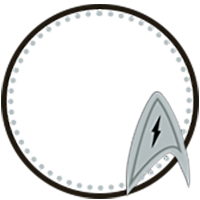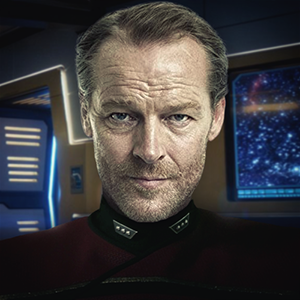‘They’re ready for you, Admiral.’
Alexander Beckett turned from the window beyond which sprawled the stunning vistas of Paris, its soaring modern towers blending with centuries-old architecture. After all the reports he had seen of invaded Federation worlds, of the cities razed, of the devastation wrought, it felt cold and distant to stand before the untouched horizons of Earth.
He straightened his uniform to hide his discomfort. ‘I’m sure they are,’ he muttered. ‘Nothing quite like the vultures gathering after the battle’s won.’
His young aide blinked, clearly uncertain how to respond.
‘That was a joke, Lieutenant,’ Beckett lied, and followed the officer through the double doors, and into the hushed chambers of the Federation Security Council. The eyes of some of the most powerful people in the galaxy latched onto him the moment he stepped inside, but Beckett didn’t falter, taking his place before the main display along the wall. They were powerful, but today they needed him.
Fleet Admiral Kirsten Clancy, Starfleet Commander-in-Chief, sat up. ‘Admiral Beckett, the floor is yours. This council eagerly awaits your final assessment of the Vaadwaur crisis.’
Eagerly awaits, Beckett thought wryly. Like they’ve been on the front lines instead of safe here, on Earth.
‘Thank you, Admiral Clancy.’ He cleared his throat. ‘Ladies and gentlemen of the Security Council, I stand before you today to deliver what will be, barring any unforeseen complications, the final comprehensive intelligence assessment of what we are now calling the Nightfall Incursion: the Vaadwaur invasion and the accompanying Blackout.’
Beckett tapped his PADD, and the display behind him flickered to life, showing a map of Federation space with pockets of red indicating where Blackout zones and Vaadwuar invasions had been.
‘Seventy-seven days ago, the galaxy changed. Subspace fluctuations rendered warp travel and communications impossible across vast regions of the Alpha and Beta Quadrants. The Vaadwaur Supremacy, having reestablished itself in the Delta Quadrant, launched a coordinated invasion through the Underspace network. Today, I can confirm that the crisis is effectively over. The Blackout has been lifted. Vaadwaur occupation forces have been defeated. A ceasefire with the Supremacy has been negotiated. And I have been able to travel here.’
A ripple of self-satisfied smiles spread across the table. Beckett resisted the urge to roll his eyes.
‘However,’ he continued, his tone sharpening, ‘this victory came at considerable cost, and one we have not yet fully determined. Starfleet defence forces, where they were targeted, were decimated. Over seventeen worlds subjected to orbital bombardment. More star systems occupied by Vaadwaur forces, with civilian casualties still being tallied. And countless acts of heroism by Starfleet officers who found themselves cut off from command, forced to make decisions that would normally require approval from this very chamber.’
The smiles faded. Good.
‘Victory was brought about through four stages,’ he continued, watching as several council members subtly shifted in their seats. ‘First, the response of Starfleet forces to incursion zones. This consisted of local defence forces, most of whom were ill-equipped to hold back the Vaadwaur. The Supremacy had clearly scoped out our operations, and used the Blackout to isolate key locations from defenders. Areas that were not cut off from major fleets were largely untouched by the Vaadwaur, like Earth. Further responses from Starfleet thus came from the Fourth Fleet’s initiative to use alternative FTL technology, and dispatch our units as widely as we could.’
‘At great cost to many of our limited resources, such as our benamite reserves,’ said one admiral coolly. ‘I trust the deployment of such volatile and precious technology will be rolled back?’
Beckett tried to not stare the man down. It was exactly the sort of point he expected from an admiral who had spent this much time riding a desk on Earth: not inaccurate, but misguided. ‘Of course,’ Beckett said, the sneer inescapably sliding into his voice. ‘However, I cannot think of a more fitting emergency for which these technologies might have been deployed.’
He turned back to the table, pressing forward. ‘The second stage of victory came through the destruction of the Blackout Outposts. Multiple units across different regions located and eliminated them, with approximately forty-seven disabled overall. This effectively collapsed the Blackout in key strategic regions.
‘This enabled Starfleet forces, from those previously cut off to Fourth Fleet reinforcements, to rally and repel the Vaadwaur. It is critical to note that the Supremacy’s forces were massively inferior to those of the Alpha and Beta Quadrants, and even to Starfleet alone. They were entirely reliant on the isolation of the Blackout, and their mastery of Underspace, to militarily challenge us.’
A rumble of approval ran through the council. It was the sort of simplistic answer they would like, Beckett thought; a reassurance that the Federation was stronger, and had only been challenged through trickery that had been both resolved, and that they could not have possibly anticipated.
That it wasn’t their fault. And that it wouldn’t happen again.
At last, the figure at the far end of the table stirred and spoke. ‘That’s what we did, Admiral. What about what happened elsewhere? The arrangement with the Cardassians? The ceasefire in the Delta Quadrant?’
Beckett swallowed as the cool eyes of President Anton Chekov fell on him. He switched the display to show the border between Federation and Cardassian space. ‘One of our most successful undertakings, Mister President, was the expedition of my officer, Captain Hargreaves, to Cardassia Prime. As we know, their Science Ministry had developed – likely in collaboration with the Turei – the means of sealing Underspace apertures, and deployed them a year ago. Through our scientific cooperation, we determined how to repeat the process. Twenty two platforms were deployed at known aperture locations, initiating what we have called the Wall Protocol, effectively sealing the Underspace tunnels across our quadrants.’
‘A temporary measure, I hope,’ ventured Admiral Chen of Starfleet Tactical. ‘The strategic advantages of Underspace travel could -’
‘Lead to the collapse of interstellar civilisation as we know it?’ Beckett cut off lightly. ‘We have an agreement with the Cardassian Union to continue to share information and findings on and from the platforms. They are committed, as they were a year ago, to taking Underspace off the table entirely. After the Vaadwaur, I agree with them entirely.’
‘And it gives a chance,’ offered one of President Chekov’s advisers, ‘to build bridges with the Union. We’re both stakeholders in a shared undertaking, now.’
Chekov did not linger on the point, eyes still on Beckett. ‘And the ceasefire?’
Beckett’s display shifted to show a distant region of the Delta Quadrant. ‘Here we come to perhaps the most remarkable achievement of the entire crisis. Starships already deployed in the Nacene Reach, the Odyssey and Constellation Squadrons, responded to emergent political crises stirred by what turned out to be the Vaadwaur. Through this, they located the new Vaadwaur capital world, which appears to be some sort of fallback location the Supremacy founded a thousand years ago.’
Admiral Clancy’s eyes narrowed. ‘This would have been a lot for one awoken battalion to achieve, after all.’
‘Indeed, ma’am.’ Beckett inclined his head. ‘We haven’t confirmed that other groups of Vaadwaur were likewise in stasis, but it seems likely. Between this new capital world and those veteran groups, the Supremacy was able to rally over the past quarter-century and put itself on a footing to restore itself. It is our belief, however, that they targeted the Alpha and Beta Quadrants because of our distance; they believed we could not turn around and respond as their previous subjects had. That we did find them, and brought with us some friends, is the final nail in the coffin for their invasion.’
Beckett thumbed his PADD, changing the display one last time. Now, the map of the Alpha and Beta Quadrants looked familiar. Stable. Free of incursion or aperture.
‘The Supremacy has agreed to withdraw all forces from the Alpha and Beta Quadrants. It seems they had little choice; the strategic advantage of the Blackout is gone, their access to our regions through Underspace has been cut off, and their forces were depleted and stretched thin. Moreover, they now face the prospect that their old enemies in the Delta Quadrant have learned of their new capital’s location.’
‘So they’ve retreated to protect themselves,’ President Chekov surmised.
‘Precisely, Mister President. It might not look like it, as some of our brightest worlds burn. But they stand to lose a lot more than we do.’
Clancy frowned. ‘Their technology.’
It wasn’t a question, but Beckett knew better than to be cute with the Commander-in-Chief. ‘On that, I have no answers, I’m afraid. It is clear that the Vaadwaur technology has advanced in leaps and bounds beyond what Voyager reported from the awoken battalion. They demonstrated remarkable weapons, armaments, and warship design. The most likely explanation is that their new capital world dedicated centuries to research and development, anticipating that any restoration of the Supremacy would require technological prowess, not merely control of Underspace.’
Beckett didn’t believe it, not fully. But information on the new Vaadwaur capital world, on what the Vaadwaur had been doing for a thousand years, was limited. At the moment, he only had suspicions, but this was not a room for baseless suspicions.
There was more. There always was. Discussions of humanitarian responses, questions about the condition of their neighbours – the Romulans, the Klingons. The Vaadwaur had been forcibly ejected, the way had been shut, but what would come next?
Bright sparks remained. The knowledge that for every core world that had been devastated, another had been untouched. Alpha Centauri, Andoria, and Vulcan had all faced annihilation. Not only had they been saved, but neighbouring worlds, strong worlds – Tellar, Vega, Archer – had been spared the blight of the Vaadwaur, paving a road to recovery. The Federation frontier, and many of its lines of commerce and transport, was in remarkable condition, poised to ferry resources and support back into the interior. Beckett held no trust for the Cardassian Union, but he did believe in their consistent desire to keep Underspace locked away, a desire the Federation finally shared; a desire that could, perhaps, perhaps, unite them.
‘That went well, sir,’ offered his aide as Beckett stepped back into sunlight-soaked corridors.
‘For now,’ Beckett snorted. ‘Give them a minute and they’ll be fighting over who gets credit and who sets policy moving forward. Politics as usual.’
‘But surely the crisis has changed things, sir? The alliances, the balance of power between the frontier and the core…’
Beckett paused at the door, looking back at the council chamber where the galaxy’s future was being discussed by those who had barely felt the Vaadwaur boot at their throats.
‘Oh, things have changed, Lieutenant. The board’s been entirely reset. But the game? The game remains the same.’ He waved a hand the way he’d come. ‘Watch and learn. They’re already positioning their pieces for the next round.’
‘The next round, sir?’
Beckett’s lips curled. ‘Peace, Lieutenant. Peace is always harder to navigate than war. And a lot more dangerous for careers.’

 Bravo Fleet
Bravo Fleet










